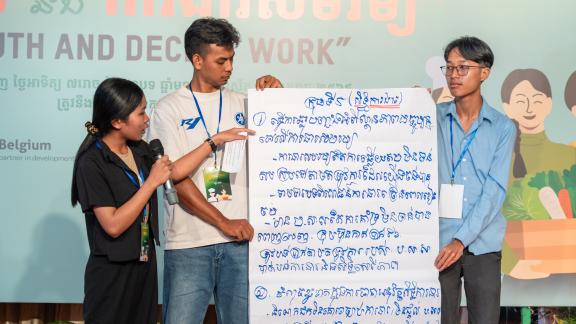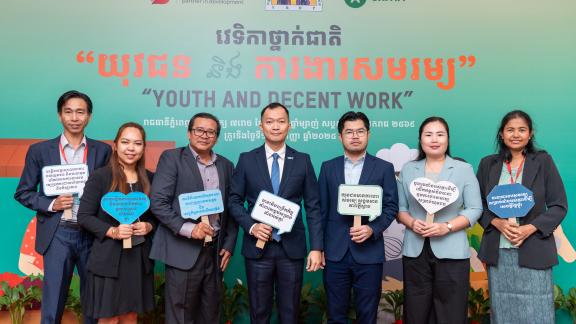In a country where nearly two-thirds of the population is under the age of 30, Cambodian youth face persistent challenges in securing decent employment. With 88% of the national workforce engaged in informal labor, many young people lack access to fair wages, social protection, and safe working conditions. These barriers not only limit their economic potential but also hinder their ability to contribute meaningfully to Cambodia’s development.
In response to these pressing issues, the Youth Resource Development Program (YRDP) and Oxfam jointly convened a National Forum on Youth and Decent Work in Phnom Penh on 14 September 2025. The event gathered over 200 participants, including youth leaders from the agri-food sector, community-based organizations, civil society actors, and key stakeholders from both public and private sectors.
The forum served as a platform to raise awareness of global employment frameworks, explored mechanisms for labor market expansion, and fostered inclusive dialogue aimed at addressing the structural challenges young people face in accessing decent jobs. It also emphasized the importance of youth participation in shaping labor policies and recovery strategies in the post-COVID era.
“I played a role of a worker in the agri-food sector whose workplace doesn’t provide NSSF benefits. That wasn’t just acting, it reflected my real-life experience. This personal challenge is a broader issue affecting workers.”
Sreypich is currently a fourth-year student majoring in Social Work at the Royal University of Phnom Penh. After graduation from high school, she left her hometown in rural Tboung Khmum province to pursue higher education in Phnom Penh. To support herself and cover her living expenses, she began searching for a job while studying. She has been working for four years and recently works at a restaurant, but like many young workers in the informal sector, she receives no benefits under the National Social Security Fund (NSSF).
“On behalf of young people, I urge the Ministry of Labor and NSSF to strengthen education and outreach on labor rights in rural and remote areas. Let’s ensure all workers, especially those in food and agriculture are protected,” Sreypich said.
She also emphasized the importance of education and labor rights. “I hope the Ministry of Education, Youth, and Sport will integrate labor rights and NSSF benefits into school curricula, so students grow up fully aware of their rights.”
Having engaged with YRDP’s training program as a youth volunteer, Sreypich said, “I have learned about labor rights, the Constitution, and social security benefits. This opened my eyes to how employers sometimes exploit workers.”
Discussions at the forum on Youth and Decent Work centered on the four pillars of decent work: job creation and productivity, rights at work, expansion of social protection, and promotion of social dialogue. These were examined in alignment with Cambodia’s national development goals and Sustainable Development Goal 8, which advocates for inclusive economic growth and full employment.

Fifth group takes the stage with a presentation on labor rights highlighting workers' voices and the push for fair treatment. Photo: Oxfam
The event also highlighted emerging opportunities in green and renewable energy sectors, calling for increased investment in digital literacy, entrepreneurship, and vocational training to prepare youth for future-ready jobs. Participants urged the establishment of an integrated national policy framework and stronger public-private partnerships to create sustainable employment pathways.
“We are not just preparing for the future, we are shaping it. Decent work means having the power to choose, to grow, and to lead with dignity,” said a youth group representative during the presentation.
Recurring message throughout the forum was the need to amplify youth voices in decision-making processes that influence labor market dynamics. Stakeholders called on the Royal Government to prioritize youth employment in national recovery plans and urged international organizations to support data collection and knowledge-sharing initiatives.
“Talking about Youth and Decent Work feels incomplete when many young workers, including myself, are still excluded from NSSF protection,” Sreypich added.
Currently, 2.6 million workers are covered by social security schemes, and 2.8 million people benefit from cash transfer programs, including vulnerable youth and informal workers.
“We urge all stakeholders to commit to a national youth employment strategy that reflects the realities of Cambodia’s labor market and empowers young people to lead.”
As part of its broader commitment, Oxfam alongside partner organizations is implementing programs to strengthen labor rights and social protection. These include improving conditions for women in agriculture, integrating social protection with public financial systems, and addressing the environmental and social needs of garment workers. All efforts aim to promote fair labor practices and expand support for vulnerable workers, contributing to poverty reduction and sustainable development.
Insights from the forum will be compiled into a policy brief to be shared with the Ministry of Labor and Vocational Training, development partners, and other stakeholders. The goal is to inform future strategies and reinforce youth-centered labor reforms that ensure every young Cambodian has the opportunity to thrive through decent work.

Honorable guests gather for a group photo during the national forum on Youth and Decent Work. Photo: Oxfam
